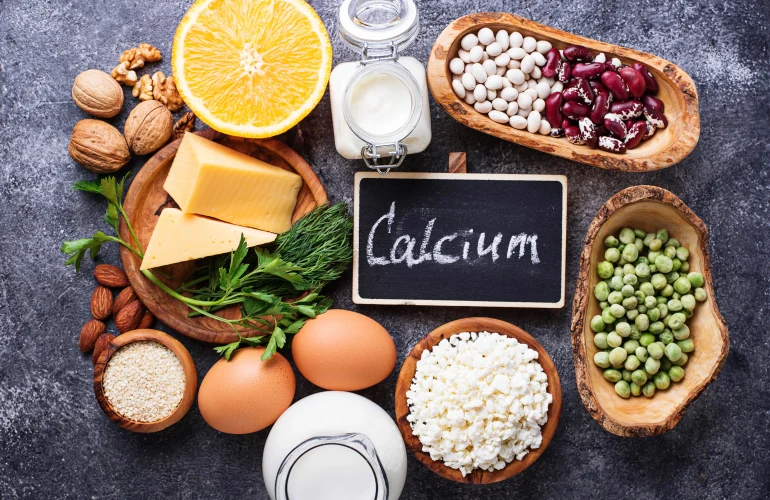Knee pain is one of the most common joint issues affecting people of all ages. Whether it’s due to arthritis, injury, or inflammation, your diet plays a vital role in either easing or worsening your knee discomfort.
Let’s dive into the best and worst foods when it comes to knee pain – and how simple changes in your plate can lead to long-term joint relief.
Foods to Eat for Knee Pain Relief
These foods support joint health, reduce inflammation, and help your knees move more comfortably.
These foods support joint health, reduce inflammation, and help your knees move more comfortably.
1. Fatty Fish (Salmon, Sardines, Mackerel)
Rich in omega-3 fatty acids, these help fight inflammation and reduce joint stiffness and pain.
💡 Tip: Aim for 2 servings a week.
2. Leafy Greens (Spinach, Kale, Methi)
Packed with antioxidants, vitamins C and E, and calcium, leafy greens help maintain strong bones and reduce oxidative stress.
3. Berries (Blueberries, Strawberries, Amla)
Full of anti-inflammatory compounds and vitamin C which helps in collagen formation – crucial for joint support.
4. Turmeric (Haldi)
Curcumin, the active compound in turmeric, has natural anti-inflammatory properties. It’s especially effective for arthritis-related pain.
🧉 Try a warm glass of haldi doodh (turmeric milk) before bed.
5. Nuts & Seeds (Almonds, Walnuts, Flaxseeds)
Loaded with healthy fats, magnesium, and zinc, they promote joint repair and reduce inflammation.
6. Whole Grains (Brown rice, Oats, Quinoa)
They lower C-reactive protein (CRP) levels—a marker of inflammation linked to arthritis.
7. Olive Oil
Extra virgin olive oil contains oleocanthal, a compound that mimics anti-inflammatory drugs like ibuprofen.
8. Garlic & Ginger
Both have been shown to reduce inflammation and may help reduce symptoms of arthritis.
Foods to Avoid in Knee Pain
These trigger inflammation, worsen joint stiffness, and can accelerate the breakdown of cartilage.
1. Sugary Foods (Sweets, Cakes, Sodas)
Sugar increases the release of inflammatory messengers called cytokines. It also contributes to weight gain, adding pressure on the knees.
2. Refined Carbs (White bread, Pasta, Maida)
They spike blood sugar and promote inflammation in the body.
3. Fried & Processed Foods
French fries, samosas, nuggets—these are loaded with trans fats and increase inflammation.
4. Red Meat & Processed Meats
High in saturated fats and advanced glycation end-products (AGEs), which are linked to inflammation and joint damage.
5. Excessive Salt
Too much sodium causes water retention and swelling in joints.
6. Alcohol
Overconsumption affects liver function, which plays a role in managing inflammation in the body.
7. Dairy Products (Full-fat milk, cheese, butter)
In some people, dairy may trigger joint pain due to its protein casein, which can irritate tissues around joints.
✅ Try switching to plant-based milks if you notice increased discomfort after dairy intake.
Summary Table: Foods to Eat and Avoid in Knee Pain
| Eat These | Avoid These |
| Fatty Fish (Omega-3s) | Fried and Processed Foods |
| Leafy Greens | Sugary Foods |
| Berries | Refined Carbs |
| Turmeric | Red and Processed Meats |
| Nuts and Seeds | High-Sodium Foods |
| Whole Grains | Full-fat Dairy (for some individuals) |
| Olive Oil | Excessive Alcohol |
| Garlic & Ginger | Trans Fats |
Why Diet Matters in Joint Health
Maintaining a healthy body weight is key—every extra kilogram adds stress to your knees. Anti-inflammatory foods not only help you manage pain but can also slow the progression of joint damage in chronic conditions like osteoarthritis or rheumatoid arthritis.
Pro Tip for Better Knee Health
- Stay hydrated
- Include vitamin D and calcium in your diet
- Get regular, low-impact exercise like walking or swimming
- Use spices like turmeric and ginger in cooking regularly
When to See a Specialist
If knee pain persists despite dietary changes, it’s time to consult a joint specialist. You may need personalised treatment, physiotherapy, or advanced diagnostics to get to the root cause.
![]()




